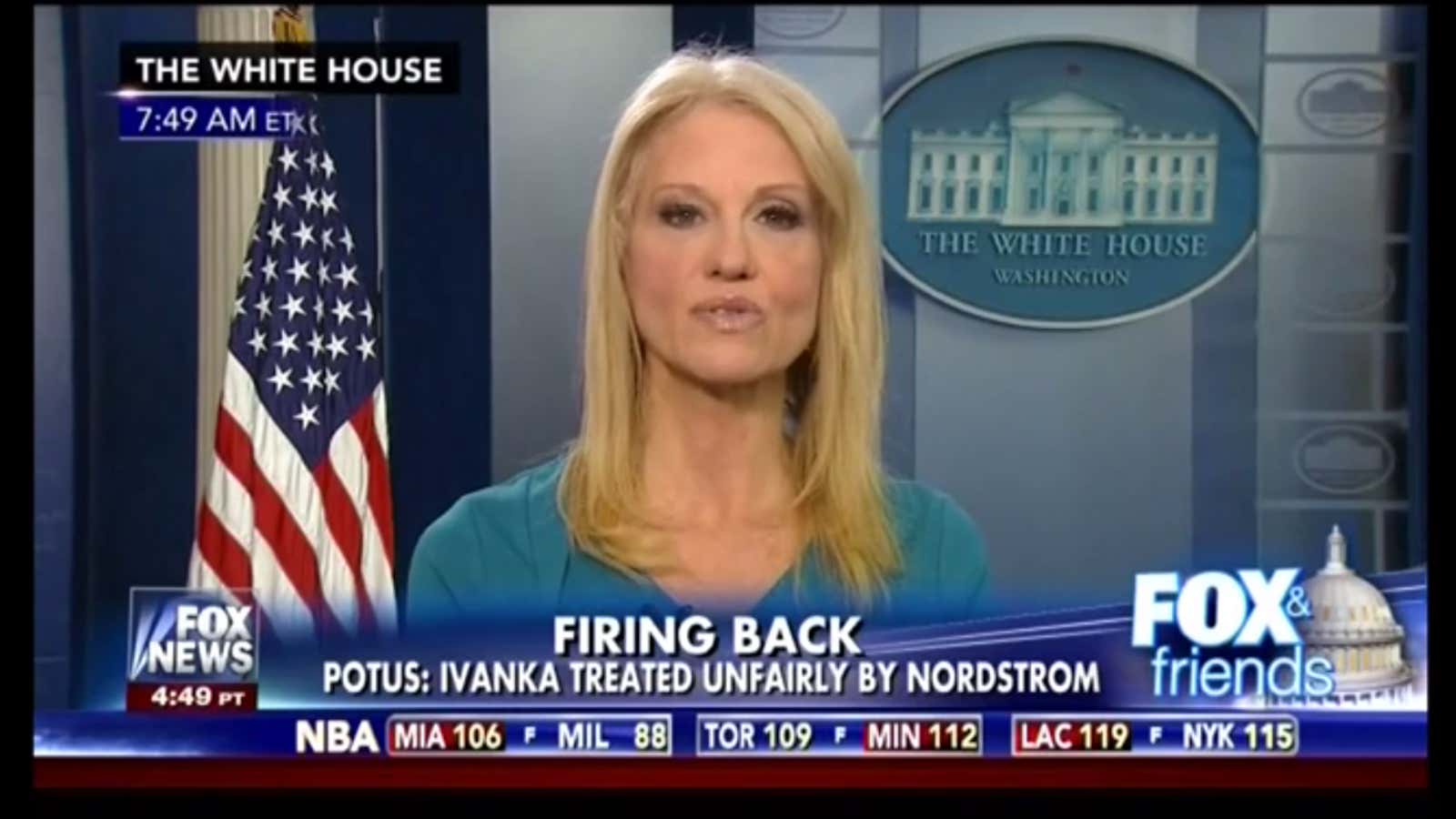The latest controversy from the White House began as it almost always does: with a tweet by US president Donald Trump, who voiced his displeasure yesterday on the social media platform with Nordstrom, the luxury department store chain that recently announced it would stop selling his daughter Ivanka Trump’s fashion line. His tweet, saying the store had treated her “so unfairly”, was a definite “abuse of power,” ethics experts say.
But it was White House advisor Kellyanne Conway’s comment on ”Fox and Friends” this morning, urging viewers to “Go buy Ivanka’s stuff,” that may prove most problematic. Conway’s endorsement for Ivanka’s products appear to have violated strict ethics rules governing federal employees.
“Go buy Ivanka’s stuff, is what I would tell you,” Ms. Conway said on Fox News. “It’s a wonderful line. I own some of it,” she said. “I’m going to give a free commercial here. Go buy it today, everybody.”
Employee standards established by President George H.W. Bush in 1989 set out 14 clear guidelines for executive branch employees, including clear rules about “misuse of position”—specifically related to endorsements, and using government property and time, for unauthorized purposes. The rules include:
- A prohibition against employees using public office for their own private gain [or] for the private gain of friends, relatives, or persons with whom they are affiliated in a non-Government capacity, or for the endorsement or any product, service, or enterprise;
- A prohibition against engaging in financial transactions using nonpublic information, or allowing the improper use of nonpublic information to further private interests;
- An affirmative duty to protect and conserve Government property and to use Government property only for authorized purposes; and
- A prohibition against using official time other than in an honest effort to perform official duties and a prohibition against encouraging or requesting a subordinate to use official time to perform unauthorized activities.
In January, the Office of Government Ethics (OGE) chief Walter Shaub reminded the executive branch about misuse of position in a director’s note. The note didn’t mention the Trump administration specifically, but seemed aimed right at it. “These rules serve to guard the federal service against ethical problems that could undermine public confidence in the integrity of the government’s operations,” Shaub said at the time. “By focusing on this rule and their other basic ethical obligations, employees can truly honor the principle that public service is a public trust.” The OGE had urged Trump to divest his business interests entirely before he took office, but the advice was not heeded.
In a January interview with The Hollywood Reporter, Conway said that she and her husband will be paying for their four children’s private-school tuition on “two government salaries,” if he joins the government, too. The White House has yet to respond to a query by Quartz confirming whether she is an official executive branch employee, with a salary paid by the American taxpayer, and thus beholden to the ethics rules.
Ethics experts, including Norm Eisen, the Obama administration ethics czar, say Conway’s actions clearly violate rule 5 CFR 2635.702, regarding the use of public office. “It’s a violation of the rule, pure and simple,” he told MSNBC.
So what happens next? The OGE does not enforce these rules; that is a matter for the Department of Justice, which can force civil law violators to pay penalties through its “Federal Programs Branch.” With Trump appointee Jeff Sessions just sworn in as the new US attorney general, whether the department decides to investigate Conway’s actions will be closely watched.
If the DOJ declines to investigate or prosecute, agency ethics officials can take disciplinary action.
White House press secretary Sean Spicer said during a press briefing Thursday afternoon that Conway had been “counseled on the subject,” but didn’t elaborate on who had provided that counsel, and what it entailed.
